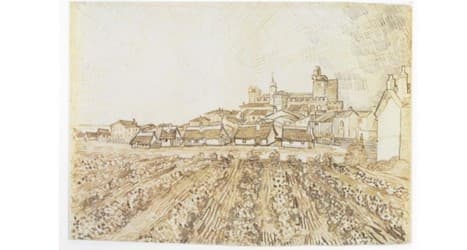Swiss pay steep legal fees in Van Gogh case

Switzerland paid $1.6 million in legal fees despite winning a US lawsuit over a Van Gogh drawing donated by a businessman accused of exploiting its Jewish former owner, according to a report on Friday.
The heir of a Jewish collector, Margaret Mauthner, who sold the drawing to Swiss businessman Oskar Reinhart in 1933 before fleeing Nazi Germany six years later, brought the case against Switzerland in 2009.
She insisted Reinhart, who later gave the drawing, "Street in Saintes-Maries", to Switzerland, had taken advantage of the precarious situation her grandmother was in at the time to pay an unfair price.
Switzerland, which has always maintained Reinhart paid a fair price for the piece, won the case before both a lower New York court, and again upon appeal in 2012.
The drawing, valued at several million dollars, is again hanging in the Reinhart collection at the public Winterthur museum in northeastern Switzerland.
But the Tages Anzeiger daily reported on Friday that an internal Swiss Federal Culture Office report showed the small Alpine country remained saddled with nearly 1.5 million Swiss francs ($1.6 million) in legal fees.
The culture office in Bern told the ATS news agency that it was worth the cost, since the case set an important legal precedent.
While Switzerland strives to make things right when it has acted in a morally dubious manner, when it has done nothing wrong, it also must defend its property rights, at any cost, Yves Fischer, deputy chief of the culture office, told ATS.
In a similar case with the opposite outcome, Switzerland last year returned a 17th century silver goblet from a national museum to the estate of German-American collector Emma Budge.
The Swiss National Museum said in June 2012 that an investigation into the origins of the "Lerber Lerche" goblet discovered it was purchased in 1937 at a sale of items belonging to Budge held months after her death.
The proceeds from the auction went to a bank account blocked by the Nazis, preventing the owners from benefiting.
Budge's private collection, including paintings, furniture and porcelain, was reportedly one of the largest auctioned during the Nazi era.
Comments
See Also
The heir of a Jewish collector, Margaret Mauthner, who sold the drawing to Swiss businessman Oskar Reinhart in 1933 before fleeing Nazi Germany six years later, brought the case against Switzerland in 2009.
She insisted Reinhart, who later gave the drawing, "Street in Saintes-Maries", to Switzerland, had taken advantage of the precarious situation her grandmother was in at the time to pay an unfair price.
Switzerland, which has always maintained Reinhart paid a fair price for the piece, won the case before both a lower New York court, and again upon appeal in 2012.
The drawing, valued at several million dollars, is again hanging in the Reinhart collection at the public Winterthur museum in northeastern Switzerland.
But the Tages Anzeiger daily reported on Friday that an internal Swiss Federal Culture Office report showed the small Alpine country remained saddled with nearly 1.5 million Swiss francs ($1.6 million) in legal fees.
The culture office in Bern told the ATS news agency that it was worth the cost, since the case set an important legal precedent.
While Switzerland strives to make things right when it has acted in a morally dubious manner, when it has done nothing wrong, it also must defend its property rights, at any cost, Yves Fischer, deputy chief of the culture office, told ATS.
In a similar case with the opposite outcome, Switzerland last year returned a 17th century silver goblet from a national museum to the estate of German-American collector Emma Budge.
The Swiss National Museum said in June 2012 that an investigation into the origins of the "Lerber Lerche" goblet discovered it was purchased in 1937 at a sale of items belonging to Budge held months after her death.
The proceeds from the auction went to a bank account blocked by the Nazis, preventing the owners from benefiting.
Budge's private collection, including paintings, furniture and porcelain, was reportedly one of the largest auctioned during the Nazi era.
Join the conversation in our comments section below. Share your own views and experience and if you have a question or suggestion for our journalists then email us at [email protected].
Please keep comments civil, constructive and on topic – and make sure to read our terms of use before getting involved.
Please log in here to leave a comment.